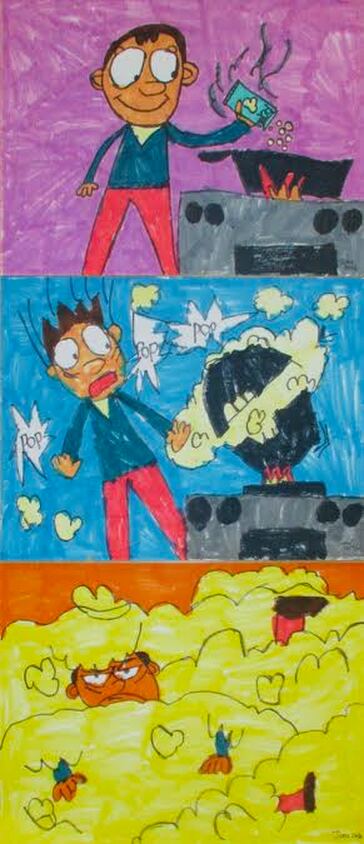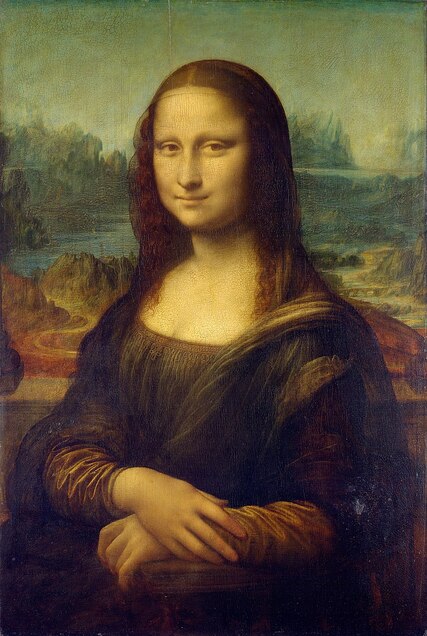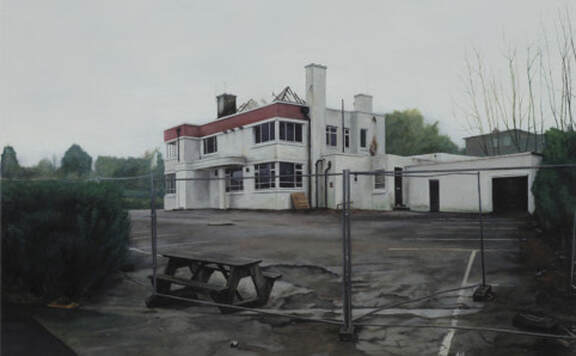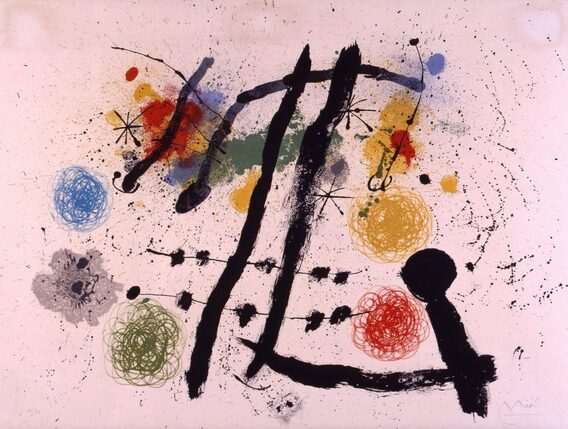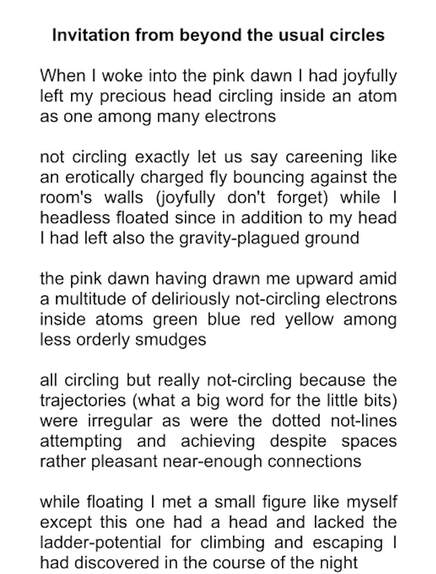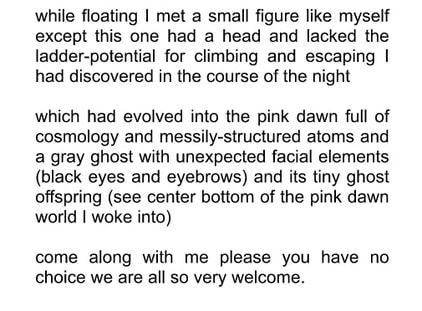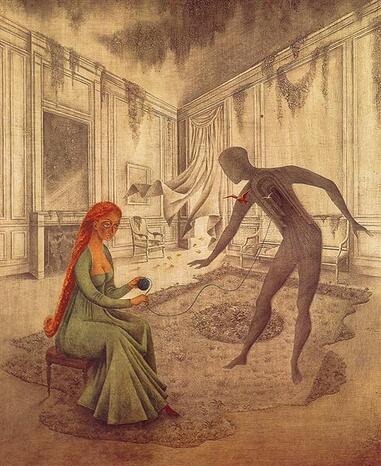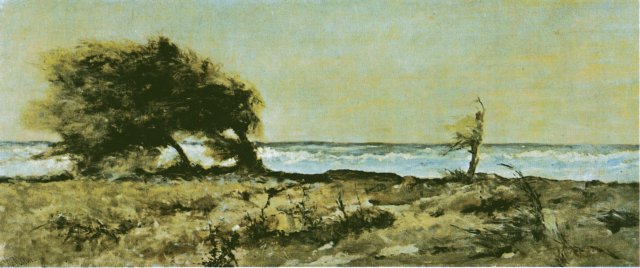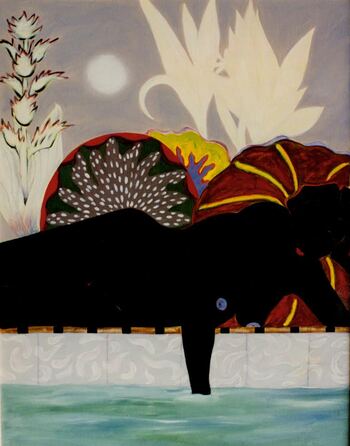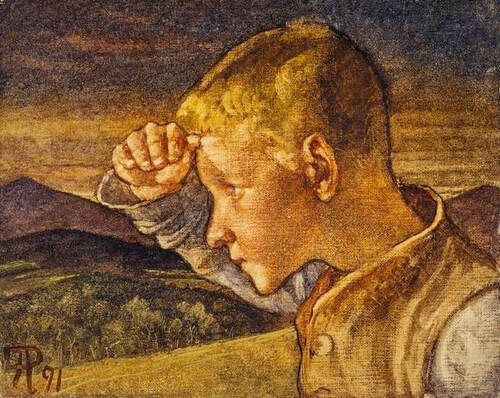|
Quadrato di Villafranca o Esercitazione di tiro (Shooting Practice) Above the mapping you stood naming the plateaus, the ravines, the wasted arrows. Loss never ended with the end of the battle. We undressed and mislabelled our bodies as a spell for goodbye, spread your charts—evergreen’s deep ambrosia across the hill. Small sun lanterns measured our sleep--the sleep of a lover’s hand curled into a lover’s hand, your hair entwined in her hair, legs firm entanglement in legs—your head on my lap, you listened to the nightwind batting at moths, the bullfrog’s thrum and blurry mopoke’s howl among the melaleuca. Looking through blades of grass, not looking with your eyes, as you crossed the plains you said "I know you." Maureen Alsop Maureen Alsop, PhD is the author of four collections of poetry: Apparition Wren, Mantic, Later Knives & Trees and Mirror Inside Coffin. Her poems have been published widely including AGNI, Kenyon Review, Blackbird, and other; she is the recipient of several poetry prizes including Harpur Palate's Milton Kessler Memorial Award, and the Frances Locke Memorial Award. This poem was written through a collective, collaborative engagement with writers Heather Bryant, Christina Cook, Marcia LeBeau.
1 Comment
Popcorn Man after six-year-old’s marker drawing on paper In midst of flame and steam he pours a stream of popcorn corn in the popping pot that popping slow at first spedup bangs harder in the pot than rain against a tinroof top. When it erupts popping off its top it goes bursting through window and door, popping all the way to downtown where it rains apocalyptic popcorn in the streets filling alleys filling trenchcoat pockets trashbins, tunnels filling the entire banking district. There I gaze at the pugnacious baseball sized slant rain popcorn raining in the arcades, store fronts and in movie marquees. Soon I see there’s nothing left but popcorn mountains in a sprawling popcorn mountain range where basking high rise wealth once proudly stood. Think of their size so big and weight. Each popped corn light a billion trillion of them filling its art- framed universe so dense and tight so heavy in cooling to a white blackhole inside that if you got under and went to its pinpoint center there’d be nothing of its hiss nor squeak of its compacting tightness heard and in that silence invisibly you’d read the echo, read the indivisible absence also of all light. If you could see. But see her here who made it, drew it out of her mind. Its creation’s what in size and weight and shape she’d seen and sees now also from outside the frame with us. Beneath it all her popcorn man’s poor popcorn hands and feet stick out so still and numb as if asleep-- his face disfigured by his bulging popcorn cheek his eyes so dazed and cold and out of reach for popcorn sake. Richard Becker Richard Becker is a concert pianist, composer and Director of Piano Study at the University of Richmond. He has had a Bread Loaf Scholarship for poetry, a Vermont Studio Center Fellowship as a poet, and, as a composer has been a MacDowell Fellow. Becker has published poetry in the U City Review, The Baltimore Review, America, Columbia, Cold Mountain Review and Main Street Rag. La Gioconda This way to the Mona Lisa Only the tired guard shows no surprise. With folded arms he leans against a wall and notes one woman moving through the queue, a blonde with ample breasts and slender thighs. The best today, he thinks. Well built and tall. He stutter taps a foot against the floor, and checks the time, and yawns a little sigh. To him you’re like some criminal of war condemned and placed on permanent display, encased in sturdy glass for all to view. You’ll never be released and cannot die. He stands at ease. He rarely looks your way, accustomed to the smirk behind his back and numb to eyes that slice across his neck. Richard Meyer This poem first appeared in the journal Measure, and it won top honours in the 2013 Great River Shakespeare Sonnet Contest. Richard Meyer, recipient of the 2012 Robert Frost Farm Prize, lives in Mankato, MN. His book Orbital Paths was a silver medalist winner in the 2016 IBPA Benjamin Franklin Awards. Jesus Was a Man of Colour "I have a dream that my four little children will one day live in a nation where they will not be judged by the colour of their skin but by the content of their character." Martin Luther King, Jr. August 28, 1963, Lincoln Memorial, Washington D.C. His life began with electrified air over Bethlehem: shimmering curtains emerald green, aurora red with sapphire threads and gold from His Father’s glory slipping through the midnight from heaven’s veil. His face was olive and brown and joy. His smiles were many colours—they’d paint anyone’s face the colour of love, even now through those immortal pages inked in his blood, the colour of sacrifice. Sorrow comes in shades of crimson and purple. The robe He wore —variegated and seamless—lay at the foot of the cross where the soldiers gambled for it. In the fury, when the ground rumbled, what tore were the curtains in the temple; all the stars spilled to the ground, they were sewn into cloth, the fabric of heaven. Sky darkened black & blue, and remorse, but glimmers of grace started seeping through. Remember the colour of hope, the pure crystal of it, rainbow after rainbow, when floodwaters subsided? Remember, the Blessed Hope will quench the flood of lies. Remember the Man of many colours who is the Son of God, who knows no colour, except the colour of your heart. John C. Mannone John C. Mannone has work in Blue Fifth Review, Poetry South, Peacock Journal, Baltimore Review, Windhover and others. He won the Jean Ritchie Fellowship (2017) in Appalachian literature and served as the contest’s celebrity judge for the National Federation of State Poetry Societies (2018). His third collection is Flux Lines (Celtic Cat, 2019). He edits poetry for Abyss & Apex and other journals. He’s a retired physics professor living in East Tennessee. http://jcmannone.wordpress.com George Shaw, The Age of Bullshit (2010)* "I paint the paintings of all the times and all the thoughts I lack the language to describe." George Shaw 1. In 1980, my friend David Morgan took me on a pub-crawl around Liverpool to show me the historical bar interiors. From the hand-carved ornamentation above the polished bars to the paneling, from the ceilings to the chairs, stools, and doors, he pointed out the signs of expert craftsmanship. Liverpool had been a great ship-building city and when a ship was finished, and before work on the next had begun, various woodworkers, cabinet makers, carvers, and other outfitters turned to fitting out pubs. The same exotic woods that went into the interiors of the most expensive yachts, the same elaborate ornamentation, and the same classic stained-glass panels and brass fittings, all found their way into designing and building the City’s most famous and beautiful public houses. the painting’s detail contradicts destruction by heavy machinery of the portico’s precision its fervent, modernist lines made from a photo he’d taken himself, details so awfully exact it’s perfect - but something’s not right, like the eyes of the dead in Italian cemeteries like the flat darkened windows in this abandoned building, the dead stare outwards looking but not seeing us 2. They came with bulldozers on trucks to the orange groves in the town where I grew up and, after marking the boundaries with wooden laths with red ribbons attached, they dragged the navel orange trees out by their roots, piled them in the centre of the naked fields, and set them on fire. They erected chain-link fences all around, as if it were a construction site rather than the scene of devastation, and then, when the bulldozing and burning were done, they flattened and leveled the ground. Before long, they were pouring concrete foundations and erecting pre-fabricated two-by-four walls and nailing on the sheet-rock lathing. Last came the plasterers to slather on the stucco in pastel pinks, yellows, and pale blues. walking through the streets in each new development I imagined orange blossoms, as their scent had been heavy and thick in the air what do the words mean when we say that time and space elide? Is it that the stones crack, erode, crumble, and crash back into the past? when the walls were just an idea, the rock not yet quarried, nor plaster mixed, when the first horse-drawn plow carved groves out of the desert? 3. There is mystery surrounding ruins, ghosts in the unused residue of what was once vital and active. When we look now at chateau ruins in the hills of southern France, time seems to be measured only in decay and disuse. But, in the middle of a busy street in Rome, I looked down into a great hole in the highway, a deliberate hole with elaborate railings all around. Below, and visible from above, were layers of Roman civilization measuring time in physical space, layers of time, like the rings in an ancient fallen tree. inevitably time calculates destruction as entropy’s force slows the atoms of the world to a snail’s pace. Death lingers with its cold sameness nothing’s left but memories and things die under their own weight making them masks blackened icy eyes stare back it begins to die death drifts from unused chimneys a glazed mourning shroud painted so deftly you know the perfect thing has perished. Charles D. Tarlton * Shaw’s own title for this painting of the Hawthorn Tree, once a pub on the Tile Hill Housing Estate outside Coventry where George Shaw grew up. There are three Shaw paintings of the pub – one when it seems still to have been operating, this one after a fire that destroyed the roof, and a third that shows a mass of rubble behind a chain-link fence, rubble left after the pub was torn down. colours of time - a misinterpretation this is how time passes in my mind. it’s skewed and stained with hues with jagged lines that run through the middle splintering my mind. I measure the hours in colour and I spend eternities trying to figure out if I am real or not. if I am here or not. do I exist outside the fortifications of my mind? moments are counted in stains. time stops when I’m open and my insides are pouring out. time is too far away in yellow. my friend in oregon cannot be reached by my bare, outstretched hand, for the sun has disappeared ever since her sister left. how will she read the shadows on her garden clock? the blue closes over my head. time is in seconds and I have learned that I cannot breathe while that clock is ticking. green is the clock here. emerald trees line the looming cliffs; the kind of time that will forever climb higher than those mountains. it all gets away from me and that, I cannot help. I am merely a passenger on this train until my clock begins to unwind. the finality of it all is that these clocks will turn black as the days become the past. my memories will be strung up on lines, displayed for all to see. if only someone would pick them up and read them, they could see the times of my life. caitlin grace mowry caitlin is a high school student living in utah after moving from the east coast two years ago. her poems typically tie into her personal life and the challenges she has faced. writing gives her a way to see her thoughts on a page and express them more clearly. caitlin has never entered a poetry contest before and is looking for a chance to share her work with more people than just her small class of writing students. ** Rose Becoming Limb and Thorn The background somehow seems the muse for moment loved you dared not lose descending from recurring thought as melody that must be taught to colors dancing, dark and bright, engaging discord and delight in movements that from mind to brush, unhurried, recreated rush of impulse given studied grace suspended in its captive space for other eyes to orchestrate as symphony to celebrate such beauty so begotten born to rose becoming limb and thorn. Portly Bard Portly Bard: Old man. Ekphrastic fan. Prefers to craft with sole intent of verse becoming complement... ...and by such homage being lent... ideally also compliment. ** What His Delirium Disclosed: Smudged constellations and sooty bruising in rose mist colliding fisted sutures with flicked graffiti, on which he’d scribbled shivering thatch strokes, adrift crescendos of syllables all a-clattering like pearls latched to bamboo saplings, shards to thorned patches, chants to restless tunnels of throat-- which he shuttered but (taunting lightning from his mind’s turret’s den) then detonated into gusts of clustered, cycloning zones. D. R. James D. R. James has taught college writing, literature, and peace-making for 35 years and lives in the woods near Saugatuck, Michigan. Poems and prose have appeared in a variety of journals and anthologies, his latest of eight poetry collections are If god were gentle (Dos Madres Press) and Surreal Expulsion (The Poetry Box), and a microchapbook All Her Jazz is free and downloadable-for-folding at the Origami Poems Project. www.amazon.com/author/drjamesauthorpage ** On The Inside The circles are in such a tangle it’s impossible to explore them impossible to see what’s inside impossible to plumb their depths the coloured threads of a life intertwined. So I’m left with the outside which is much simpler much clearer much duller less colourful and yet still incomprehensible. Sometimes even when things are straightened and appear clear I can’t make sense of them can’t manage to join the dots and the dashes and the tangles are more beautiful which seems to be important. The colourful threads of a life intertwined round and round on the inside of my head. Lynn White Lynn White lives in north Wales. Her work is influenced by issues of social justice and events, places and people she has known or imagined. She is especially interested in exploring the boundaries of dream, fantasy and reality. She was shortlisted in the Theatre Cloud War Poetry for Today competition and has been nominated for a Pushcart Prize and a Rhysling Award. Her poetry has appeared in many publications including: Apogee, Firewords, Vagabond Press, Light Journal and So It Goes Journal. Find Lynn at: https://lynnwhitepoetry.blogspot.com and https://www.facebook.com/Lynn-White-Poetry-1603675983213077/ ** Cirque du Soleil Sunrise clambers new, energized flirting on wires suspended sprawling hung from urban sky luminous spectacle eaten in fire dazzling galaxies juggling cycling burning in circles bodies curled in balls of flame fluid as oceans rolling tumbling fusion of motion tones unfold in hoops of tempo regular rhythm rotating gyrating limbs swinging freely Kate Young Kate Young lives in Kent with her husband and has been passionate about poetry and literature since childhood. After retiring, she has returned to writing and has had success with poems published in Great Britain and internationally. She is presently editing her work for an anthology and enjoying responding to ekphrastic challenges. Alongside poetry, Kate enjoys art, dance and playing her growing collection of guitars and ukuleles! ** Conduits They told me, stay out of the power line corridor, protected by rows of electrified, barbed wire. But the linear geometry is beautiful simplicity. The metal, as conduit for hyperactive electrons, welcomes insects to participate in brief, bursting firework displays. I cannot stand forever, admiring a swamp, bathed in bug repellent. Like a fire-wall for information, through air, or in wires, something nasty is bound to get through, sting, and infect. Jordan Trethewey Jordan Trethewey is a writer and editor living in Fredericton, New Brunswick, Canada. Some of his work found a home here, and in other online and print publications such as Burning House Press, Visual Verse, CarpeArte Journal and Califragile. His poetry has also been translated in Vietnamese and Farsi. To see more of his work go to: https://jordantretheweywriter.wordpress.com ** Brainstorms A survey in 2013 showed that 65% of Americans believe humans use only 10% of our brains. From MRI technology, we now know this is a myth. MedicalNewsToday.com Aha moments arrive like lightning bolts just as you’d expect from firing neurons. Yet most thoughts bounce randomly by like tumbleweeds or balls of yarn batted out from under the sofa by a cat. Only you don’t knit. Do you own a cat? When you sleep, your brain works overtime and expects more genius from you. Sends messages in Mandarin characters. Requires you to interpret the calligraphy of ten blackbirds perched on a power line. Hands you a mic and pushes you on stage – only you don’t know the play, can’t sing, and haven’t prepared for a TED Talk. You can’t even explain why Winnie-the-Pooh shows up at sessions of Congress. You need sleep for good health, so why won’t the brain dim the lights and hum ommmm? Alarie Tennille Alarie Tennille graduated from the University of Virginia in the first class admitting women. She’s now lived more than half her life in Kansas City, where she serves on the Emeritus Board of The Writers Place. Her latest poetry book, Waking on the Moon, contains many poems first published by The Ekphrastic Review. Please visit her at alariepoet.com. ** Free You might run in circles, dog-like, but I find I like your pink background, Miro, it sends me skyward—I’m rocketed past those little ink-dots, (stars perhaps?) while other paths are being formed—These large black marks are challenges to meet, (the ultimate right way of seeing things, perhaps). Painted circular blooms are inventions. (Mother would be proud.) I feel the air on my skin, my limbs are weightless. Ah, sweet pink, you give me the space I need-- Those medium-sized inky blobs are works in progress, buds ready to burst. Shall I hitch myself to existing orbits or lay down ties for new rails? Surrounded by so much ink I can’t fail. (Lovely representations!) Once as a child, I stood before the lilac tree, squinting into the sun. Uncle snapped pictures, made predictions about me. I think I’ve surpassed them… I’m out in the pink! I may go outside the frame. Or perhaps dig deeper down, go into the pink behind that blue bloom on the left. Oh look! Here’s the Morning Star! Carole Mertz Carole Mertz is writing cento poems. She has recent work at Dreamers Creative Writing, Eclectica, Muddy River Poetry Review, Page & Spine, Voices on the Wind, and Into the Void. Carole lives with her husband in Parma, Ohio where she teaches classical music. ** Irrational Colours in a circle. Stars here and there a pink sky-- dawn’s daily hope suffusing all. However, brushed in black, over all, irrational pi looms-- chaos of man’s base nature centered, large, overbearing, marks the orderly natural scene, takes the spotlight. Yet, hope remains, for though pi’s sudden strike of bold black stroke now dominates, it does not blot out life’s circles, sky’s stars dawn’s hope. Joan Leotta Joan Leotta has been playing with words on page and stage since childhood. She loves to write ekphrastic poetry. Many of her poems have been featured here and on Visual Verse, and at the Ashmolean Museum (Oxford, England). She also writes stories, poems, essays, and novels that often feature food, family, and strong women. ** The Way You Conduct Yourself Hammers fall, klaxons sound, and cacophony reigns. Fireworks blaze, consuming anyone who encounters your tantrums and the score behind them. Ken Gierke Ken Gierke is a retired truck driver who enjoys kayaking and photography, but writing poetry brings him the most satisfaction. Primarily free verse and haiku, his poetry has appeared at Ekphrastic Review, Vita Brevis, and Eunoia Review, as well as at Tuck Magazine, and can be seen on his blog: https://rivrvlogr.wordpress.com. ** Outside the Circles Outside the circles lies a pink that is background, the colour of blood when it touches water, the colour of my life along the beach. For years I denied it—too feminine, too vulnerable. Just look at the man coming out of the surf with machete to strike the foot of a woman. She has nothing to balance. One arm shorter than the other, the pole to walk her tightrope falling to the ground. Even it passes through red. Gather the circles of gold as stars. Have the top red be the sun as it descends into bay. Have the bottom one sweep the man out to sea. Kyle Laws Kyle Laws is based out of the Arts Alliance Studios Community in Pueblo, CO where she directs Line/Circle: Women Poets in Performance. Her collections include Ride the Pink Horse (Stubborn Mule Press), Faces of Fishing Creek (Middle Creek Publishing), So Bright to Blind (Five Oaks Press), and Wildwood (Lummox Press). With six nominations for a Pushcart Prize, her poems and essays have appeared in magazines and anthologies in the U.S., U.K., and Canada. She is the editor and publisher of Casa de Cinco Hermanas Press. ** Dreaming Hors du Cercle with a quote from Joan Miró a double-trunk, pi-shaped tree, a bird singing on its branch, halting Chinese brushstrokes Throughout the time I am working on a canvas, I can feel… circles of tangled yarn—blue, lavender, green, a shaky man on stilts holding a thin bow, bent arrow at the ready, a black stripe of sidewalk …how I am beginning to love it… a curious little boy not imprisoned in some invented label gazing at a line of chattering grackles …with that love, with that love which is born… a ladder connecting earth with sky, eight-pointed stars, planets spinning off into a pink universe outside the circle …of slow comprehension. Sandi Stromberg Sandi Stromberg loves the challenges presented by The Ekphrastic Review. They combine two of her favorite activities: delving into art from all periods and writing poetry. She was recently named a finalist in Public Poetry’s 2019 nation-wide, themed contest ENOUGH. Other recent publications/acceptances include the Houston Chronicle and San Antonio Express-News, The Ekphrastic Review Challenges, and the 2020 Texas Poetry Calendar. ** Out of Questions The end or the beginning-- can either be defined? Can we tell where we stand on the wheel that spins from here to there and back again? Where do we draw the line? Is potential the same as being? Is it merely possibility or is it death, waiting to begin? Is the seed part of the space between fire and flood? And if the heart beats but the synapses remain dark, is that existence? Does life consist of blood and veins, or thought and mystery? Is this tunnel of light part of the mind’s illusion, or a path of no return that mirrors the exit from the womb? How do we make room for what isn’t there? If we draw a circle around our questions, do we create an answer? or only a symbol for nothing? Kerfe Roig Kerfe Roig finds the work of Joan Miro both playful and mysterious. You can see more of her creations, often in response to the work of others, on her website http://kerferoig.com/ or on her blogs https://methodtwomadness.wordpress.com/ (with her friend Nina) and https://kblog.blog/ ** Until Three Astérisks Sparkle Outside The Circles Here. Prostrate at crepuscular. Eyes open. Pupils dilated. Unconscious automatism oozing through the ether evoking abstracts in the ceiling superficial voids on the surface: spirals circles blotches scarring tiny forms in empty spaces camouflaged as pareidolia. Under the existence of transcendental pi arced once round the diameter: bold black matte serrated empty plains empty horizons. Celestial symbolism, bare. Devoid of perfect motion until three astérisks sparkle outside the circles at seven minutes passed midnight with all light eroded when black is as white. Tones are as colours. Impressions have departed. Expressions have returned: vacant abstract obtuse here. Alun Robert Born in Scotland of Irish lineage, Alun Robert is a prolific creator of lyrical verse achieving success in poetry competitions in Europe and North America. His poems have featured in international literary magazines, anthologies and on the web. He is particularly inspired by ekphrastic challenges. ** Shirley Glubka
Shirley Glubka has just published a new chapbook, Burst Thought Shall Show Its Root: erasure poetry. She's also been guest editor at The Ekphrastic Review and has happily contributed quite a number of ekphrases to the site. To find out more about Shirley's literary adventures, see her website: https://shirleyglubka.weebly.com Or How Could He Ever Win The Heart of Any Woman? She shuffled seasons at will, carpeted her floors with grass and wildflowers, picked the first man who showed her a spark of kindness and carved his heart in her own image. Words danced in vibrant hues over the pages of her diary, giving life to a silhouette hovering in half tones in midst of the grisaille. With an empty stare, she’d sit for hours, see his shadow kneel in front of her, listen to his fading merman’s song. She’d redress his crossed eyes, bent shoulders and slight limp, or else, how could he ever win the heart of any woman? She thought of Beauty and the Beast, although he was no beast and she was no beauty. Until the day she flung windows wide open, let gusts invade the rooms, let her skin bear the colors of dead leaves, and knew time had come to pull the thread, unravel the feelings spun around his heart. Hedy Habra This poem was first published by Gargoyle. Hedy Habra has authored three poetry collections, most recently, The Taste of the Earth (Press 53 2019). Tea in Heliopolis won the USA Best Book Award and was finalist for the International Book Award, and Under Brushstrokes was finalist for the USA Best Book Award and the International Book Award. Her story collection, Flying Carpets, won the Arab American Book Award’s Honorable Mention and was finalist for the Eric Hoffer Award. A fourteen-time nominee for the Pushcart Prize and Best of the Net, her work appears in Cimarron Review, Bitter Oleander, Fifth Wednesday Journal, Drunken Boat, Gargoyle, Nimrod, Poet Lore, and Verse Daily. Her website is hedyhabra.com La Libecciata It wasn’t the sun, but a lily— rays of Madonna’s heart spread beyond the ocean—not Pleiades grid, not a generic death—he, a dagger like waves, rows his boat through dawn’s tunnel, red-war kerchief knotted to his throat, and surrender’s white rag: a tourniquet strapped numb to his shin as king tide breaks seawall to clay. He leans into the coordinates, north as longing. I was thinking of you as a saviour, for in the battle you found yourself in the small space, found yourself alone with the second ghost; others turned their backs, and your companions were sometimes spirits. Still, beneath the water’s wake, your spine mimics sandbar’s profile, undulations shallow whip, you, who he buried-- I have to tell you something. Home was your memory of his hands-- you’ve had and have-- and take hold of his fingertips the shore against the water quivers. So, to be clear be clear. No signal. It is a flame enough, a sheen seen low upon mayday’s horizon. Time as a seaweed mirror opens and sways as it sways, dips a double knot deep through kelp, rolls back buried driftwood flames. Maybe you never wanted to tell what two married bodies claimed. There is the moment the sea better tells and of the hands you’ve held and held. Maureen Alsop Maureen Alsop, PhD is the author of four collections of poetry: Apparition Wren, Mantic, Later Knives & Trees and Mirror Inside Coffin. Her poems have been published widely including AGNI, Kenyon Review, Blackbird, and other; she is the recipient of several poetry prizes including Harpur Palate's Milton Kessler Memorial Award, and the Frances Locke Memorial Award. This poem was written through a collective, collaborative engagement with writers Heather Bryant, Christina Cook, Marcia LeBeau. Woman by a Pool I’m the Black Narcissus of your darkest dream, Who you are in pleasure, the night you are inside, The calm, slow stirring of a hand that’s not Afraid of what is swimming there, not so still As I am still, as you are, when I am near. Exploding stars have darkened me to this And all the world attends on me, and flowers. I dream this waking dream for you and while I burn and come to life and never end, you’ll Live and never die this never hour we’re in. Alan Clark Alan Clark is an artist and writer who lives in Maine, and whenever possible in Mexico. His books are Guerrero and Heart's Blood, set in pre-Conquest Mexico, and Where They Know, poems. He has shown his art in both countries. His poems have appeared in The Caribbean Writer, Little Star Journal, Adirondack Review, Zocalo Poets and more. The Shepherd Boy Dusk begins. A yawn of lavender rolls over the hills, washes up onto the fields. I count ten minutes until the sun sinks at the horizon, twenty before the last light slips away. My hand above my brow shields my eyes from a final burst of gold, streaky brush strokes that break the sky into stripes of hazy yellow and purple. The canvas of my shirtsleeve scratches against my forehead as I lean in closer, try to see over the grassy peaks in the distance. In the valleys I search for a promise of tomorrow’s sun, the early rise calling me from the mountains, a return to the field. But for now, I wait. Stand watch until I see the mobile shadows bobbing along the hills, their meander moving against the retreating light. A slow-paced race against time, so well-rehearsed I know the flock will win every time. I continue to count the minutes passing. Night falls. A blink into darkness. Alex B. Wasalinko Alex B. Wasalinko got hooked on the ekphrastic bug and followed it to Glasgow, Scotland where she spent a year exploring feminist styles of the mode. She firmly believes ekphrasis can be the tool to dismantle the male gaze once and for all. In the past, Alex’s art and poetry have been published in Esprit: The University of Scranton Review of Art and Letters and in friends’ zines. She currently lives in Scranton, Pennsylvania with her best friends and constant companions--her dog, Hamlet, and Elder Cat, Sasha. |
The Ekphrastic Review
COOKIES/PRIVACY
This site uses cookies to deliver your best navigation experience this time and next. Continuing here means you consent to cookies. Thank you. Join us on Facebook:
Tickled Pink Contest
April 2024
|

